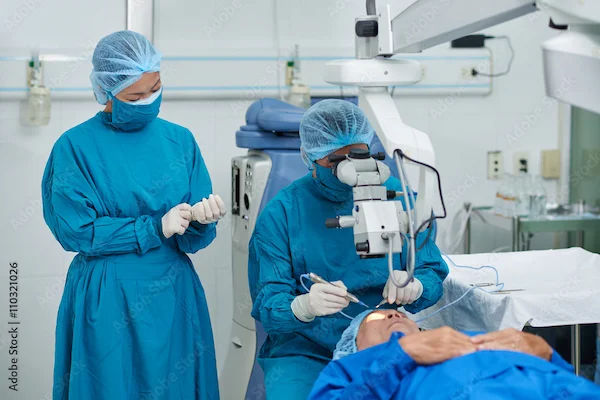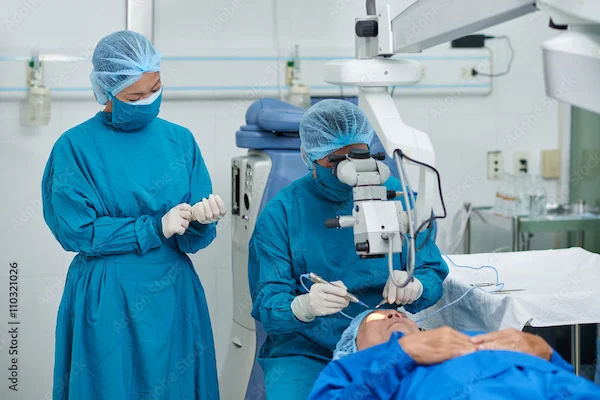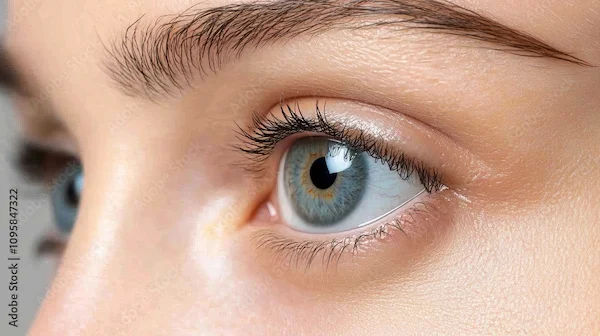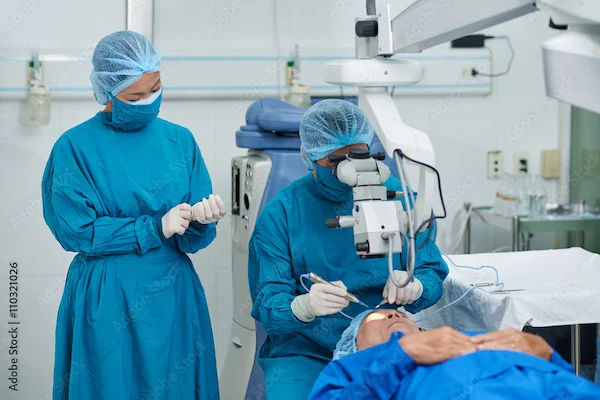Drugs Used During Cataract Surgery
Explore the key drugs used during cataract surgery, including anaesthetics, antibiotics, and anti-inflammatory agents. Learn how these medications ensure a safe, pain-free procedure and promote smooth recovery.

Written by
Last updated on 4th Jul, 2025
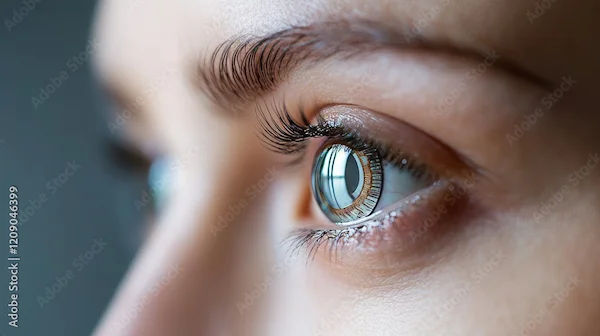
Introduction
Cataract surgery is one of the most common and successful medical procedures performed worldwide. If you or a loved one is preparing for this surgery, you might be curious about the medications used during the process. This article will help you understand the different drugs involved, their purpose, and what to expect.
Why Are Drugs Used During Cataract Surgery?
Cataract surgery involves removing the cloudy lens of the eye and replacing it with an artificial one. To ensure a smooth and pain-free experience, doctors use different types of medications, including:
1. Anaesthetics: To numb the eye and prevent pain.
2. Sedatives: To help you relax (if needed).
3. Antibiotics: To prevent infections.
4. Anti-inflammatory drugs: To reduce swelling and discomfort after surgery.
5. Pupil-dilating drops: To widen the pupil for better access to the lens.
Let’s explore each of these in detail.
1. Anesthetic Medications (Numbing the Eye)
To ensure you don’t feel pain during the procedure, doctors use one of two types of anesthesia:
Topical Anesthesia (Eye Drops): Numbing drops are applied directly to the eye. This is the most common method, allowing you to stay awake without discomfort.
Local Anesthesia (Injection): In some cases, an injection around the eye may be given for deeper numbness.
You may feel slight pressure, but no pain.
2. Sedatives (Helping You Relax)
If you’re anxious, your doctor might give you a mild sedative through an IV (intravenous line). This helps you stay calm and relaxed while remaining awake. You won’t be fully asleep but may feel drowsy.
3. Antibiotics (Preventing Infections)
Since any surgery carries a small risk of infection, antibiotic eye drops are used before, during, and after the procedure. Common antibiotics include:
Moxifloxacin
Gatifloxacin
These help keep your eye safe from bacteria. Consult an eye specialist before using any medications.
4. Anti-Inflammatory Drugs (Reducing Swelling & Discomfort)
After surgery, your eye may feel slightly irritated. Anti-inflammatory eye drops, such as:
Dexamethasone (steroid)
Ketorolac (non-steroidal)
These help control swelling and speed up healing. Consult an eye specialist before using any medications.
5. Pupil-Dilating Drops (Widening the Pupil)
Before surgery, special drops are used to widen your pupil. This gives the surgeon a clear view of the cataract for safe removal.
Consult Top Specialists for Personalised Tips
What to Expect After Surgery?
Once the surgery is done, you’ll be given post-operative eye drops to prevent infection and inflammation. Common prescriptions include:
Combination drops (antibiotic + steroid)
Lubricating drops (for dryness)
You may experience:
Mild blurry vision (temporary)
Slight discomfort or itching (normal)
Sensitivity to light (wear sunglasses)
Tips for a Smooth Recovery
Some of the tips for a smooth recovery are:
1. Use Prescribed Drops Regularly: Follow your doctor’s instructions carefully.
2. Avoid Rubbing Your Eye: This can cause irritation or infection.
3. Wear an Eye Shield at Night: Protects your eye while sleeping.
4. Skip Strenuous Activities: Avoid heavy lifting or bending for a few weeks.
5. Attend Follow-Up Appointments: Ensures proper healing.
When to Seek Help?
While complications are rare, contact your doctor if you notice:
Severe pain
Sudden vision loss
Increased redness or discharge
Conclusion
Cataract surgery is a safe and routine procedure, and the medications used ensure comfort and a quick recovery. By following your doctor’s advice, you’ll be back to clear vision in no time! If you’re preparing for cataract surgery or have concerns, Apollo 24|7 offers expert consultations and easy booking for eye check-ups. Schedule an appointment today for personalized care!
Consult Top Eye Surgeon
Consult Top Specialists for Personalised Tips

Dr. Rajeev Gupta
Ophthalmologist
24 Years • MBBS, MS (Ophthalmology)
Ghaziabad
Om Eye & Gynae Centre, Ghaziabad
Dr. S Venkateswaran
Ophthalmologist
35 Years • MBBS, PGD (OPTHALMOLOGY)
Tiruvannamalai
Shiva Eye And General Hospital, Tiruvannamalai

Dr. Esha Trideep Kshatriya
Ophthalmologist
3 Years • MBBS , MS (OPHTHALMOLOGY)
Bhuj
KCRC-Blind Peoples Association, Bhuj
Dr. Akashdipta Saha
Ophthalmologist
4 Years • MBBS, MD(Ophthalmology), Fellowship in Retina & Vitreous
Delhi
AIIMS, Delhi

Dr. Balakrishna Balaka
Ophthalmologist
6 Years • MBBS, MS Ophthalmology
Visakhapatnam
Balakrishna eye clinic, Visakhapatnam
Consult Top Eye Surgeon

Dr. Rajeev Gupta
Ophthalmologist
24 Years • MBBS, MS (Ophthalmology)
Ghaziabad
Om Eye & Gynae Centre, Ghaziabad
Dr. S Venkateswaran
Ophthalmologist
35 Years • MBBS, PGD (OPTHALMOLOGY)
Tiruvannamalai
Shiva Eye And General Hospital, Tiruvannamalai

Dr. Esha Trideep Kshatriya
Ophthalmologist
3 Years • MBBS , MS (OPHTHALMOLOGY)
Bhuj
KCRC-Blind Peoples Association, Bhuj
Dr. Akashdipta Saha
Ophthalmologist
4 Years • MBBS, MD(Ophthalmology), Fellowship in Retina & Vitreous
Delhi
AIIMS, Delhi

Dr. Balakrishna Balaka
Ophthalmologist
6 Years • MBBS, MS Ophthalmology
Visakhapatnam
Balakrishna eye clinic, Visakhapatnam

